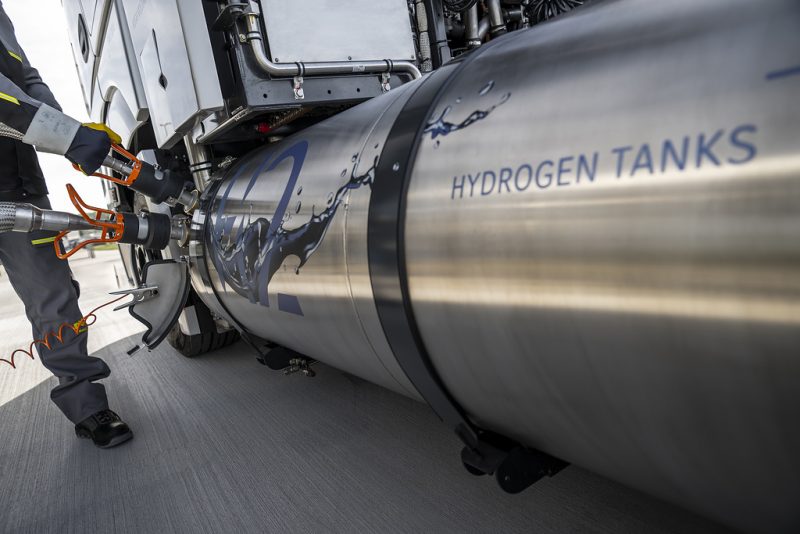Daimler Truck reaches new milestone with successful test of fuel-cell truck with liquid hydrogen
The global trucking company says it prefers liquid hydrogen in the development of hydrogen-based drives as in this aggregate state, the energy carrier has a significantly higher energy density in relation to volume compared to gaseous hydrogen
 STUTTGART, Germany: Daimler Truck reaches its next milestone on the road to sustainable transportation with the successful test of fuel-cell truck with liquid hydrogen, a prelude to the possibility of having more hydrogen-based drives.
STUTTGART, Germany: Daimler Truck reaches its next milestone on the road to sustainable transportation with the successful test of fuel-cell truck with liquid hydrogen, a prelude to the possibility of having more hydrogen-based drives.
Since last year, a Mercedes-Benz GenH2 Truck fuel-cell prototype has been undergoing intensive testing – both on the in-house test track and on public roads. Daimler Truck is now putting another prototype into operation to test the use of liquid hydrogen.
Political support for the development program comes from Daniela Schmitt, Minister of Economic Affairs of Rhineland-Palatinate, who opened the regional hydrogen week “WOCHE DES WASSERSTOFFS SÜD” (#wdws2022) on June 27 with a test drive in Wörth am Rhein, Germany.
A newly installed prototype filling station at the development and testing centre in Wörth enables the refuelling with liquid hydrogen. Recently, Daimler Truck celebrated the first successful liquid hydrogen (LH2) refuelling of the truck together with Air Liquide.
During the refuelling process, cryogenic liquid hydrogen at minus 253 degrees Celsius is filled into two 40 kg tanks mounted on either side of the chassis. Thanks to the particularly good insulation of the vehicle tanks, the hydrogen can be kept at temperature for a sufficiently long time without active cooling. Daimler Truck says it prefers liquid hydrogen in the development of hydrogen-based drives.
In this aggregate state, the energy carrier has a significantly higher energy density in relation to volume compared to gaseous hydrogen.
 As a result, more hydrogen can be carried, which significantly increases the range and enables comparable performance of the vehicle with that of a conventional diesel truck. The development objective of the series-ready GenH2 Truck is a range of up to 1,000 kilometres and more. This makes the truck suitable for flexible and demanding applications, especially in the important segment of heavy-duty long-haul transport. The start of series production for hydrogen-based trucks is planned for the second half of the decade.
As a result, more hydrogen can be carried, which significantly increases the range and enables comparable performance of the vehicle with that of a conventional diesel truck. The development objective of the series-ready GenH2 Truck is a range of up to 1,000 kilometres and more. This makes the truck suitable for flexible and demanding applications, especially in the important segment of heavy-duty long-haul transport. The start of series production for hydrogen-based trucks is planned for the second half of the decade.
Comprehensive commitment to hydrogen
Daimler Truck says it is also working together with Linde on the development of a new process for handling liquid hydrogen (“subcooled” liquid hydrogen, “sLH2 technology”). Among other things, this innovative approach enables even higher storage density and easier refuelling compared to LH2.
The companies plan for the first refuelling of a prototype vehicle at a pilot station in Germany in 2023. Daimler Truck and its partners are planning for a high level of transparency and openness around the relevant interfaces of the jointly developed sLH2 technology.
The goal is to collaborate with other companies and associations as possible to develop their own refuelling and vehicle technologies that apply the new liquid-hydrogen standard and thereby establish a global mass market for the new process.
When it comes to infrastructure for hydrogen filling stations along important transport routes in Europe, Daimler Truck says it is planning to work together with the companies Shell, BP and TotalEnergies. Daimler Truck is also a shareholder in hydrogen filling station operator H2 MOBILITY Deutschland.
In addition, Daimler Truck, IVECO, Linde, OMV, Shell, TotalEnergies and the Volvo Group have committed to work together to help create the conditions for the mass-market roll-out of hydrogen trucks in Europe as part of the H2Accelerate (H2A) interest group.
On its path towards a CO2-neutral future Daimler Truck has clearly set its strategic course and is consistently pursuing a dual-track strategy in the electrification of its portfolio with both battery-electric and hydrogen-based drives. The ambition is to offer only new vehicles that are carbon-neutral in driving operation in its global core markets by 2039.www.media.daimlertruck.com










